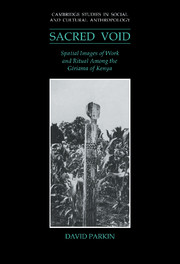Book contents
- Frontmatter
- Contents
- List of illustrations
- Preface
- Introduction
- 1 Fantasies of the west
- 2 Western Kaya, sacred centre
- 3 View from the west: cattle and co-operation
- 4 From west to east: the works of marriage
- 5 Spanning west and east: dances of death
- 6 Alternative authorities: incest and fertility
- 7 Alternative selves: invasions and cures
- 8 Coastal desires and the person as centre
- Conclusion
- Appendix 1 Three ecological zones and demographic features of southern Kilifi District
- Appendix 2 Giriama kinship and affinal terms
- Appendix 3 Giriama cattle terms
- Appendix 4 Giriama patri-clan structure
- Bibliography
- Index
- Cambridge Studies in Social and Cultural Anthropology
5 - Spanning west and east: dances of death
Published online by Cambridge University Press: 03 November 2009
- Frontmatter
- Contents
- List of illustrations
- Preface
- Introduction
- 1 Fantasies of the west
- 2 Western Kaya, sacred centre
- 3 View from the west: cattle and co-operation
- 4 From west to east: the works of marriage
- 5 Spanning west and east: dances of death
- 6 Alternative authorities: incest and fertility
- 7 Alternative selves: invasions and cures
- 8 Coastal desires and the person as centre
- Conclusion
- Appendix 1 Three ecological zones and demographic features of southern Kilifi District
- Appendix 2 Giriama kinship and affinal terms
- Appendix 3 Giriama cattle terms
- Appendix 4 Giriama patri-clan structure
- Bibliography
- Index
- Cambridge Studies in Social and Cultural Anthropology
Summary
Scripting funerary rules
As in a number of African societies, Giriama funerals are major occasions. They are attended by hundreds of people and involve lavish sacrifices of cattle and goats, and vast donations and consumption of palm wine. There is the first funeral consisting of a burial and then of feasting and dancing for altogether six days for a woman and seven for a man. Then, some one to four months afterwards, the second funeral is held, extending over three days. Sometimes the second funeral is omitted for someone not regarded as socially important enough, but this is uncommon and may, anyway, be rectified at a much later date following a misfortune in the homestead concerned.
Rather like marriage, funerals among the Giriama are supposed to follow numerous and often complicated rules. But, whereas the rules concerning who may marry whom are generally obeyed, those for holding funerals are invariably contested and are sometimes more evident in abstract argument than in practice. Yet the rules, while probably always in change, provide at least a provisional conceptual framework into which can be fitted activities following a death.
The rules specify when, where and how the corpse should be buried, who should carry it from its resting house to the grave, how young and old, and men and women, should address and behave towards each other and how long the ceremony should last.
- Type
- Chapter
- Information
- The Sacred VoidSpatial Images of Work and Ritual among the Giriama of Kenya, pp. 105 - 135Publisher: Cambridge University PressPrint publication year: 1991



